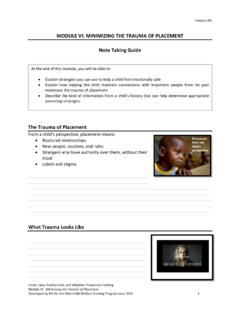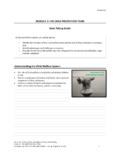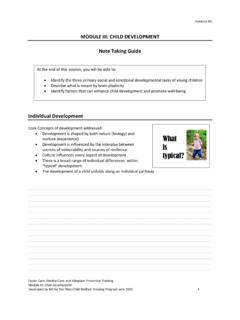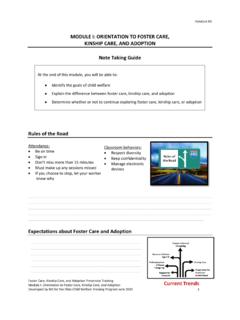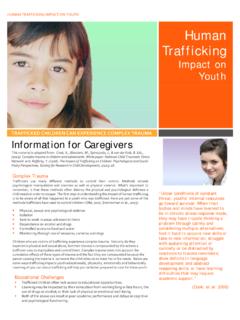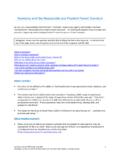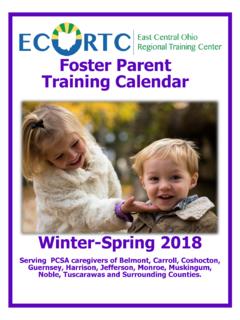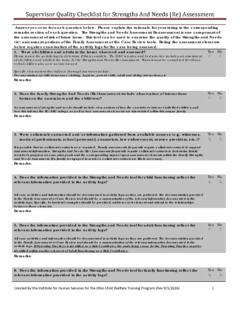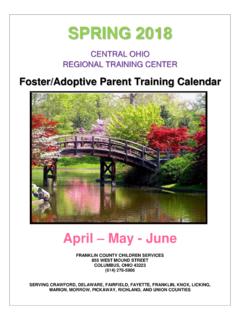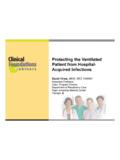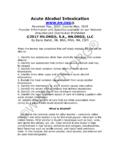Transcription of MODULE IV: TRAUMA AND ITS EFFECTS Note Taking Guide
1 Handout #1 Foster Care, Kinship Care, and Adoption Preservice Training MODULE IV: TRAUMA and Its EFFECTS Developed by IHS for the Ohio Child Welfare Training Program June 2015 1 MODULE IV: TRAUMA AND ITS EFFECTS Note Taking Guide Overview and Impact of TRAUMA Complex TRAUMA multiple traumatic events from a very young age. On one end of the development continuum is a child who has not experienced any TRAUMA . He has no TRAUMA symptoms, is developmentally on target, and has optimal social and emotional functioning. On the other end of the development continuum is a child who has experienced multiple traumas. He has significant TRAUMA symptoms, is developmentally delayed, and has severe social and emotional impairments. _____ TRAUMA and Toxic Stress The Adverse Childhood Experiences (ACE) study shows a clear relationship between the number of ACES a person has experienced and his risk for negative heath and behavioral outcomes.
2 When a child s stress response system never turns off, a child is continually flooded with stress hormones and is on constant alert. This is called toxic stress. Toxic stress can lead to developmental delays. The impact if TRAUMA is highly individualized. At the end of this training, you will be able to: Identify childhood traumas Describe how attachment can be impacted by complex TRAUMA Describe the possible behavioral indicators of a child who is experiencing toxic stress Handout #1 Foster Care, Kinship Care, and Adoption Preservice Training MODULE IV: TRAUMA and Its EFFECTS Developed by IHS for the Ohio Child Welfare Training Program June 2015 2 _____ Emotional EFFECTS Impaired attachment may result from a caregiver who is not attuned to her infant. The infant may distrust the world at large. Complex TRAUMA may impact self regulation (may not be able to express emotions appropriately) and initiative (may not feel capable of doing this by herself).
3 _____ Behavioral EFFECTS Behavior is connected to emotions. A child with complex TRAUMA may only be able to express himself through behavior. We have to stop asking, What is wrong with you? and start asking, What has happened to you? Sometimes a child experiences a sensation or event that reminds him of a past TRAUMA . These memories can bring about a TRAUMA response. If the child s coping skills cannot handle the emotions, the child may experience an emotional crisis. Handout #1 Foster Care, Kinship Care, and Adoption Preservice Training MODULE IV: TRAUMA and Its EFFECTS Developed by IHS for the Ohio Child Welfare Training Program June 2015 3 _____ Responsibilities of Caregivers and Adoptive Parents Understand a child s path into care Advocate and participate in services Be able to work with substance abusing parents Help the child develop appropriately Recognize your own TRAUMA and how it affects your parenting _____ List three ways you will use the information from this training.
4 1. 2. 3. Handout #2 Foster Care, Kinship Care, and Adoption Preservice Training MODULE IV: TRAUMA and Its EFFECTS Developed by IHS for the Ohio Child Welfare Training Program June 2015 1 MODULE IV: TRAUMA AND ITS EFFECTS The EFFECTS of TRAUMA Possible EFFECTS of complex TRAUMA : Avoids physical touch Problems with coordination, balance and body tone Increased medical problems Difficulty with managing emotions Difficulty describing and knowing feelings Poor control of impulses Self destructive behavior Aggression against others Pathological self soothing behaviors such as hair pulling, cutting, and rocking Sleep disturbances Eating disorders Substance abuse Oppositional behavior Difficulty understanding and complying with rules Re enactment of TRAUMA in day to day behaviors or play Alteration in state of consciousness Amnesia Poor sense of self Distorted body image Low self esteem Shame and guilt Can t afford to be wrong Difficulty thinking logically Lack of sustained curiosity Difficulty understanding new information Problems focusing and completing tasks Difficulties planning and anticipating Problems with understanding own contribution to what happens to them Problems with language development Vision and hearing problems The EFFECTS of a potentially traumatic event is determined by: 1.
5 The objective nature of the event For example, neglect impacts children very differently from abuse. 2. A child s developmental stage The age of the child when the TRAUMA occurs can impact the EFFECTS of the TRAUMA . For example: o Young children often do not have the language needed to describe what they are experiencing and must express themselves through behavior. o School age children often fluctuate between aggression and withdrawal. o Adolescents may re enact their TRAUMA through reckless behavior. Handout #2 Foster Care, Kinship Care, and Adoption Preservice Training MODULE IV: TRAUMA and Its EFFECTS Developed by IHS for the Ohio Child Welfare Training Program June 2015 2 3. Cultural Influences People of different backgrounds may define TRAUMA in different ways and use different expressions to describe their experience. Their symptoms may be expressed differently, based on what is culturally accepted.
6 In addition, people who are members of marginalized groups may find it difficult to access services, influencing the family s perception of helping agencies. 4. Resiliency Some children bounce back from traumatic events, while other can be devastated by them. Researchers are looking at protective factors, genetic traits, temperament, and circumstances around the traumatic event to help identify what makes a child resilient. Children are much more likely to recover if they feel supported by a trusted adult (Blaustein, M & Kinniburgh, K., 2007). 5. Removal and Placement Children experience ruptured relationships and separation from all that is comfortable and known, and are given new routines and rules. Strangers are introduced and given authority over them, creating an uncertain and instable world. Adapted from: Cook, A., Blaustein, M., Spinazzola, J., & van der Kolk, B. Eds., (2003).
7 Complex TRAUMA in children and adolescents: White paper. National Child Traumatic Stress Network. Helpful Websites: National Child Traumatic Stress Network: Child TRAUMA Academy: National Center for TRAUMA Informed Care (through the Substance Abuse and Mental Health Services Administration): Sidran Institute: TRAUMA Center at Justice Resource Institute: Handout #3 Foster Care, Kinship Care, and Adoption Preservice Training MODULE IV: TRAUMA and Its EFFECTS Developed by IHS for the Ohio Child Welfare Training Program June 2015 1 MODULE IV: TRAUMA AND ITS EFFECTS Toxic Stress As you watch the brief video Toxic Stress by Harvard s Center for the Developing Child, write down any facts that are new to you or known facts that were re enforced by this video. _____ _____ _____ _____ Positive stress response is a normal and essential part of healthy development, characterized by brief increases in heart rate and mild elevations in hormone levels.
8 Some situations that might trigger a positive stress response are the first day with a new caregiver or receiving an injected immunization. Tolerable stress response activates the body s alert systems to a greater degree as a result of more severe, longer lasting difficulties, such as the loss of a loved one, a natural disaster, or a frightening injury. If the activation is time limited and buffered by relationships with adults who help the child adapt, the brain and other organs recover from what might otherwise be damaging EFFECTS . Toxic stress response can occur when a child experiences strong, frequent, and/or prolonged adversity such as physical or emotional abuse, chronic neglect, caregiver substance abuse or mental illness, exposure to violence, and/or the accumulated burdens of family economic hardship without adequate adult support. This kind of prolonged activation of the stress response systems can disrupt the development of brain architecture and other organ systems, and increase the risk for stress related disease and cognitive impairment, well into the adult years.
9 Center for the Developing Child Handout #4 Foster Care, Kinship Care, and Adoption Preservice Training MODULE IV: TRAUMA and Its EFFECTS Developed by IHS for the Ohio Child Welfare Training Program June 2015 1 1 MODULE IV: TRAUMA AND ITS EFFECTS IMPAIRED ATTACHMENT WHAT IT IS Impaired attachment means the child has difficulty forming healthy attachments with others. CAUSES Children with impaired attachment may have had caregivers who: Were not skilled at self regulation (could not manage their emotions) Were not attuned to the child (could not read and respond effectively to the child s cues) Did not respond consistently and appropriately to the child s behavior Experienced a lot of chaos in their lives IMPACT Children with impaired attachment often do not trust others and so do not feel safe exploring their world. When children don t explore the world around them, they don t have the experiences they need for healthy development.
10 They may have difficulty learning to self regulate or take initiative. Self regulation Often children with impaired attachment do not have the coping skills they need to manage their feelings. These children: Are unable to identify emotions or know what is causing the emotions Have bodies that feel overwhelmed or shut down Are unable to effectively communicate their emotions to others Initiative Children with impaired attachment are focused on survival rather than developing skills they need to become productive adults and function in society. They often have low confidence that will be able to meet their needs. These children: Have difficulty with problem solving Have a poor sense of self Have multiple developmental delays Blaustein, M. E., & Kinniburgh, K. M. (2005). Providing the family as a secure base for therapy with children and adolescents. Attachment Theory into Practice.
